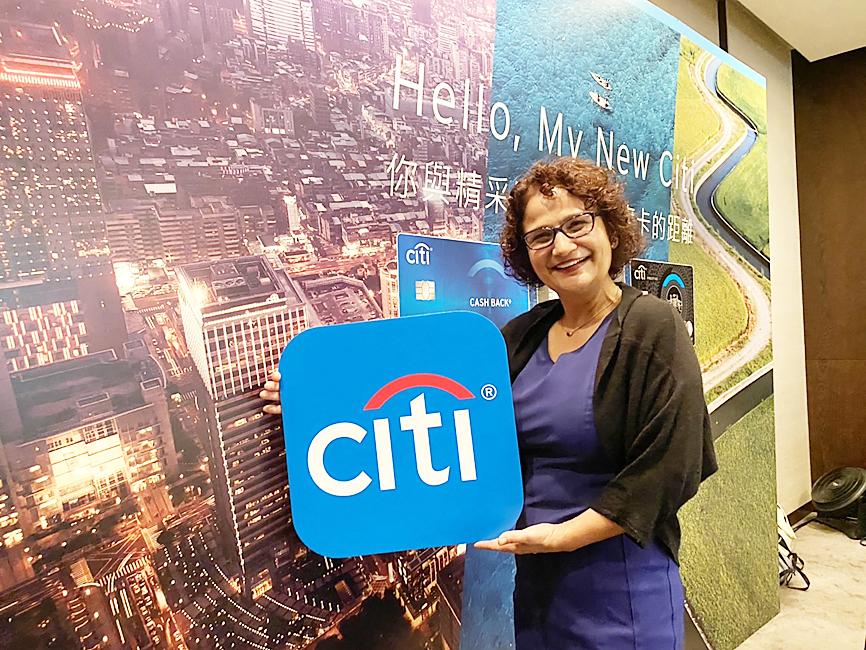Citibank Taiwan Ltd (台灣花旗) has revamped its three credit cards, adding higher reward rates and an improved digital banking app in a bid to attract customers before an expected rebound in credit card spending next year.
The bank has raised the cashback rate of the Citi Cash Back Plus Card to 2 percent on all purchases, domestic and overseas, even insurance premium payments, Citibank told a news conference in Taipei yesterday.
The revamped card offers a higher cashback rate and simpler rules than the previous rate of 0.5 percent on regular purchases, and 1.5 percent on dining, refueling and supermarket spending, as Citibank hopes to encourage people to use the card for all purchases, it said.

Photo: Allen Wu, Taipei Times
As people are embracing mobile payment options, the bank is offering a special cashback rate of 10 percent for new clients who connect their Citi Cash Back Plus Card to one of the 10 most popular electronic wallets in Taiwan, such as Apple Pay, Line Pay Money or Jko Pay (街口支付), within three months of activating the card, it said.
Given that the COVID-19 pandemic has mostly halted international travel, the bank would allow holders of the Citi PremierMiles Card to redeem miles on domestic travel programs, it said, adding that people do not need to worry about miles expiring because they last a lifetime at Citi.
Holders of the Citi Prestige Card can also transfer airport delivery services to domestic travel programs due to the pandemic, it said.
The bank has made the digital banking app more intuitive after receiving complaints from consumers and would continue to improve the app to optimize its digital services, it said.
Credit card spending slowed this year, the bank said, as people canceled overseas travel plans amid the pandemic and did not spend as much on domestic travel as they spend on international travel, Citibank Taiwan country business manager Muge Yuzuak told the Taipei Times at the news conference.
Yuzuak said that she expects spending momentum to remain stable in the first half of next year and to stage a rally in the second half.
“It takes time for a recovery. The virus is unlikely to stop spreading soon, but we expect to have a different story by the end of next year,” Yuzuak said.
Citibank Taiwan, with a total of 2.14 million activated cards, ranks sixth among all of the banks in Taiwan and first among foreign banks, Financial Supervisory Commission data showed.
Asked whether the bank was seeking to improve its ranking, Yuzuak said that the bank concentrates on quality instead of quantity.
Citi aims to build a long-term relationship with customers, she said, adding that customers who feel good about its services would stick with Citi.

South Korea’s equity benchmark yesterday crossed a new milestone just a month after surpassing the once-unthinkable 5,000 mark as surging global memory demand powers the country’s biggest chipmakers. The KOSPI advanced as much as 2.6 percent to a record 6,123, with Samsung Electronics Co and SK Hynix Inc each gaining more than 2 percent. With the benchmark now up 45 percent this year, South Korea’s stock market capitalization has also moved past France’s, following last month’s overtaking of Germany’s. Long overlooked by foreign funds, despite being undervalued, South Korean stocks have now emerged as clear winners in the global market. The so-called “artificial intelligence

‘SEISMIC SHIFT’: The researcher forecast there would be about 1.1 billion mobile shipments this year, down from 1.26 billion the prior year and erasing years of gains The global smartphone market is expected to contract 12.9 percent this year due to the unprecedented memorychip shortage, marking “a crisis like no other,” researcher International Data Corp (IDC) said. The new forecast, a dramatic revision down from earlier estimates, gives the latest accounting of the ongoing memory crunch that is affecting every corner of the electronics industry. The demand for advanced memory to power artificial intelligence (AI) tasks has drained global supply until well into next year and jeopardizes the business model of many smartphone makers. IDC forecast about 1.1 billion mobile shipments this year, down from 1.26 billion the prior

People stand in a Pokemon store in Tokyo on Thursday. One of the world highest-grossing franchises is celebrated its 30th anniversary yesterday.

Chinese artificial intelligence (AI) start-up DeepSeek’s (深度求索) latest AI model, set to be released as soon as next week, was trained on Nvidia Corp’s most advanced AI chip, the Blackwell, a senior official of US President Donald Trump’s administration said on Monday, in what could represent a violation of US export controls. The US believes DeepSeek will remove the technical indicators that might reveal its use of American AI chips, the official said, adding that the Blackwells are likely clustered at its data center in Inner Mongolia, an autonomous region of China. The person declined to say how the US government received